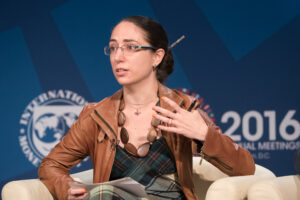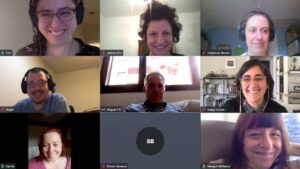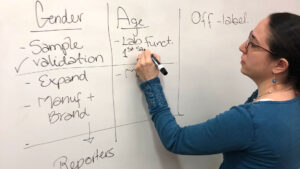Emilia Díaz-Struck has gone from the classrooms of the Universidad Central de Venezuela to a leadership post in Washington in one of the most important organizations that supports, promotes and produces resources for investigative journalism worldwide. The work of Díaz-Struck, the appointed incoming executive director of the Global Investigative Journalism Network (GIJN), shows that collaboration and networking are the best responses to the difficult challenges journalism has faced and continues to face.
Díaz-Struck's first foray into journalism was at the newspaper of the Central University of Venezuela (UCV, by its Spanish acronym): Hora Universitaria [Campus Hour]. She then jumped to the evening newspaper El Mundo (now discontinued) in Caracas, where she pioneered computer-assisted journalism, now known as data journalism.
Díaz-Struck began experimenting with the use of Excel and databases in Venezuelan journalism when no one else was doing it.
"I remember that, already at that time, I was looking for inspiration from journalists who were making a difference and who were doing things differently...I was like that weirdo in a newsroom, looking at an Excel every day," Díaz-Struck told LatAm Journalism Review (LJR).
By that time, at the end of the 2000's, a process of restrictions was starting to be created in Venezuela that diminished the possibility of sharing in the media opinions different from those of then-President Hugo Chávez's government. In addition, at that time, the price of Venezuelan crude oil began a decline, carrying along a public debt that affected citizens.

Emilia Díaz-Struck during the Annual Meetings of the International Monetary Fund (IMF) and the World Bank (2016). (Photo: Ryan Rayburn/IMF)
"When I chose to do journalism, we were already in a situation of a lot of inequity, a lot of corruption, human rights violations, money laundering, a very polarized country, etc. And, for me, the answer to that whole situation was journalism. Journalism as a service to society," Díaz-Struck said.
Some time later, she was asked to lead the research area of the Instituto Prensa y Sociedad de Venezuela (IPYS), a non-governmental organization that works for the promotion, defense and training in freedom of expression, investigative journalism and the right to information.
While there, she had the opportunity to come into contact with journalists who were doing large-scale investigations throughout Latin America. Journalists who, according to Díaz-Struck, acted as mentors and were a source of tools for her work. Among them, she highlighted Ewald Scharfenberg (Venezuela), Mónica González (Chile), Ricardo Uceda and Gustavo Gorriti (Peru), Giannina Segnini (Costa Rica), Marina Walker (Argentina), Carlos Eduardo Huertas and María Teresa Ronderos (Colombia), Carlos Fernando Chamorro (Nicaragua), Mónica Almeida (Ecuador) and Mabel Rehnfeldt (Paraguay).
"Sometimes people think that among journalists no one is going to help each other, that everyone is competing against each other, but I have found a different world in this process. I've found many people who have been very generous and who have taken the time and space to share experiences," the Venezuelan journalist said.
Díaz-Struck also highlighted events such as the Latin American Investigative Journalism Conference, the Global Investigative Journalism Conference and the Gabo Festival. As well as the work of organizations such as the Latin American Center for Investigative Journalism (CLIP), Connectas, Convoca, the Knight Center for Journalism in the Americas, and the Brazilian Association of Investigative Journalism (Abraji). These were gathering and collaboration spaces that allowed her, "little by little, to weave a network and see how in situations where it seems that things are not possible, they really are."
Parallel to her journalistic work, Díaz-Struck taught social communication students at UCV for more than seven years and gave investigation and data workshops to journalists from all over Venezuela. "It’s important to think about how we can continue training the next generations and about who’s going to take over, who comes next, who is going to continue doing the work. This will allow for the sustainability of journalism."
Her eye for teamwork led her to collaborate from Caracas with news outlets such as the Washington Post, Poder y Negocios magazine, and also to co-found the investigative newsroom of Armando.info. Eventually, a job on Coltan trafficking opened a path for her to join the International Consortium of Investigative Journalists (ICIJ). She started as an investigative journalist and moved through the positions of investigative editor, Latin America coordinator and data team leader.
Díaz-Struck was part of major transnational investigations that made ICIJ well known: Offshore Leaks, Panama Papers (2017 Pulitzer Prize), Implant Files, FinCEN Files, and Pandora Papers.

Data team of the International Consortium of Investigative Journalists during the FinCEN Files (Photo: ICIJ).
"When I started at the Consortium, we had 11 people on the team, today it’s up to 40. So I could watch the growth being part of the team all the way to the use of technology," she said. "And what I have sought, when I’ve come to these roles, is precisely to give back what I’ve received, in those early years, from so many colleagues," she added.
GIJN is an association of more than 240 nonprofit investigative journalism organizations around the world. Díaz-Struck will join the team as editor-at-large in mid-August, and in September she will become executive director, during the network's biennial conference to be held in Gothenburg, Sweden from Sept. 19 to 22.
The Venezuelan journalist will take over from David Kaplan, who has been GIJN's founding executive director for more than 10 years.
"The role I'll start soon has to do with the sum of what I've done all these years. On the one hand, the academic aspect. On the other hand, the innovation and data aspect. Also, investigative reporting and collaboration in networks. All of that added together is what makes the Global Investigative Journalism Network," Díaz-Struck said.
It also presents her with interesting, but also complex challenges. "There is a challenge that has to do with the nature of press freedom situations. We see more and more journalists doing investigations in exile and in circumstances of personal and digital threats," Díaz-Struck said. "We also have a challenge that has to do with the world of technology, of data, of the volume of information that is circulating and aiding disinformation. So, it's a complex and interesting landscape at the same time."

"It’s important to think about how we can continue training the next generations and about who’s going to take over, who comes next, who is going to continue doing the work," Díaz-Struck said. (Photo: ICIJ)
Among Díaz-Struck's main goals are to continue empowering the global community of investigative journalists and to build resources to strengthen the abilities of these professionals. In addition, to continue producing investigative stories that help and inform citizens around the world, strengthening democracies, monitoring power, and exposing situations that would otherwise remain hidden.
Despite the challenges facing journalism, and especially investigative journalism, Díaz-Struck's vision is optimistic, with room for experimentation and a constant search for possible paths. "That's why I talk about persistent optimism. They can't say no to me, but [rather] how I learn to make it happen."
Editor's note: The Knight Center for Journalism in the Americas is a member of the GIJN.